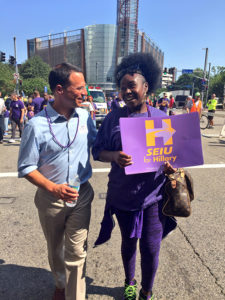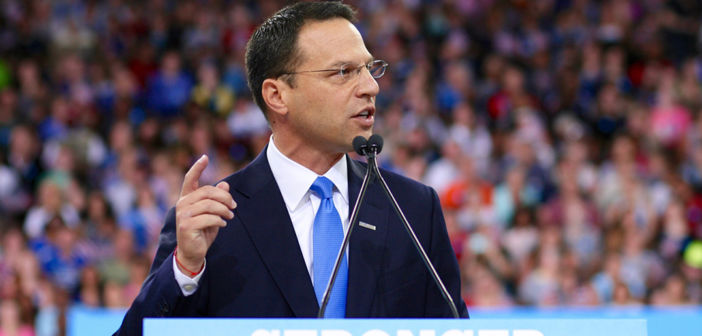
Josh Shapiro (Courtesy of the Josh Shapiro Campaign)
Josh Shapiro is the Democratic nominee for the attorney general of Pennsylvania. He is running on a progressive platform, which includes confronting campus sexual assault and protecting students’ rights to education. The Brown and White spoke with Shapiro on Sept. 24 about the policies he would institute as attorney general.
The Brown and White also conducted a Q&A session with Shapiro’s opponent, John Rafferty.
Q: In your own words, what is the role of the attorney general?
A: My role is to make sure our communities are safe, your constitutional rights are protected and that the criminal justice system works fairly for everyone.
Q: You have a six-point plan to combat sexual assault on college campuses. One aspect of this plan is to develop a model memorandum of understanding. Could you further explain the model memorandum of understanding?
A: What I want, if God forbid there is a sexual assault or rape on campus and the victim reports that, I want to make sure that everyone who could possibly be in that reporting chain knows exactly what it is that they are supposed to do. Oftentimes a survivor of sexual assault doesn’t know where to go. There’s a lot of bureaucracy, and we need to make sure they know exactly where to go and once they get there that the administrators or others they talk to know exactly who they are supposed to report to . . . And that model memorandum of understanding is something that I think will clarify people’s roles and clarify support services and be a big help.
Q: At Lehigh, we already have mandatory reporters, which is what I think you’re referencing in people knowing their role on campus. Even with mandatory reporters, we still have issues with people fully reporting. How will you work to make sure everyone fully reports and understands his or her role as a mandatory reporter?
A: By making this a priority in my administration. We will beef up the educational component of working with
universities, both the students and faculty and staff, make sure they understand their role and we’ll beef up enforcement so if they don’t report — if survivors are not getting the proper care and attention they need — we will hold them accountable.
Q: I recently watched “The Hunting Ground,” a documentary about sexual assault on college campuses and afterward the director spoke to us. He said that many colleges fear reporting the true statistic or true number of rapes because they don’t want to damage their reputation as a university. What would you say to that?
A: It’s no excuse. We can’t tolerate a culture where things are covered up. I won’t tolerate it. And that goes to the last point that I made in terms of my six-point plan, which is if I find out that higher education institutions are purposely not disclosing sexual assault and rape on campus, I will hold them criminally liable. This is not about college ratings. This is about protecting young men, young women from sexual assault.
Q: The Clery Act was started because of an incident that happened at Lehigh. There have been reports in recent years that colleges were not compliant with the Clery Act. How will you ensure universities are in compliance with the Clery Act and fully report?
A: I will hold all higher education institutions accountable if they purposely fail to disclose information under the Clery Act or any other statute. I will have a zero tolerance policy for that, and I will work with universities to create a culture of consent to develop policies and procedures so that staff and others on college campuses know their responsibilities in the event of a sexual assault. And that victims and survivors of sexual assault have access to the care and support services that they deserve.
Q: There are stories on college campuses about police or administrative officials encouraging victims of sexual assault to not go through with rape kits, be examined by the hospital or press charges against their attacker. How will you work to combat this?
A: If someone is discouraging a woman or man from speaking up about their sexual assault, they’re doing so in a way to shield from the public what occurred. I will hold them responsible. Times that, depending on the facts of the case, could even result in charges being brought. We can not allow for a culture of cover-up to fester on college campuses today when it comes to sexual assault.
Q: In the spring of 2014, a Lehigh student vandalized Umoja, a multicultural house on campus, with racial slurs. The student was expelled and the university was federally investigated. However, the university signed a voluntary resolution with the Education Department’s Office of Civil Rights in order to avoid sanctions. Some felt this was a slap on the wrist. How, as attorney general, will you ensure that universities are fully held accountable?
A: Universities should be required to follow all the laws of the commonwealth and certainly the Pennsylvania and U.S. constitutions, and if there is a violation of one’s civil rights, I will hold them accountable. I can’t speak to the specific facts of the situation that you’ve referenced, but in general, campuses should not be a place where people can escape the rule of law or where issues get swept under the rug. We need to make sure that they are safe, healthy environments where everyone’s rights are protected.
Q: How does your plan to protect every student’s right to a good education affect college students, and what will you do to make college more affordable?
A: The constitution guarantees students, primarily K-12 students, the right to a thorough and efficient education. I want to make sure that in every zip code in Pennsylvania, that constitutional right is protected. As it relates to college students, in addition to campus sexual assault, which is a huge issue, we see a lot of financial fraud against college students — particularly when it comes to repayment of student loans, where students end up getting themselves caught up in a fraud and they oftentimes have no protection. As attorney general, I will protect those students and those college graduates.
Q: What is your stance on the decriminalization or legalization of marijuana?
A: I support legalizing medicinal marijuana. I support reducing penalties for those who are caught with small amounts of marijuana.
Q: Lehigh has been described as a politically apathetic campus. In an election year where students (appear) more disheartened than ever from the political system, why is it important for students to vote?
A: Because you get the government that you vote for. At the end of the day, students can be frustrated with their choices, but these are the choices and it is beyond the point of selecting the candidates. That was the primary, now the candidates have been chosen, and it’s critically important that your voice be heard. If you sit on the sidelines and fail to participate, then your interests, ultimately, are not at the table. And if you want the issues that you care about to be at the table, you have to vote.
Editor’s note: This interview has been edited for clarity and length.






Comment policy
Comments posted to The Brown and White website are reviewed by a moderator before being approved. Incendiary speech or harassing language, including comments targeted at individuals, may be deemed unacceptable and not published. Spam and other soliciting will also be declined.
The Brown and White also reserves the right to not publish entirely anonymous comments.
1 Comment
Is Josh Shapiro any relation to local attorney Kenneth Shapiro? The same attorney who has a hand on collecting consumer debt for LVNV funding? Who bought up consumer debt for pennies on the dollar in 2008? And used the local courts as debt collection enforcers against people who lost everything in 2008-2009, and didn’t have the resources to fight back? If Josh Shapiro is a member of that family, he has no ones interests at heart but his own. They feed off the misery of others and have become quite wealthy doing so. And the county courts support them. Too bad for the rest of us right?